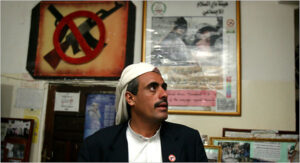Sheikh Abdulrahman Al-Marwani | Yemen

Sheikh Abdulrahman Al-Marwani (Yemen) Credit: Tamara Abdul Hadi, New York Times
Melodic calls to prayer rise upward, echoing across Yemen’s capital city of Sana’a. Children gleefully run down a flooded street in Old City, past buildings with striking geometric patterns made from burnt red brick and white gypsum. Then a whistling noise cuts through the air, followed by explosions.
Hope lies at the edge of the city – at the Dar Al-Salaam Organisation (DASO) which means “House of Peace”. Founded in 1997 by Sheikh Abdulrahman Al-Marwani, DASO is a Yemeni NGO working in conflict resolution, negotiation and countering violent extremism through engagement of tribal and religious leaders and by working with youth. Fiercely driven by his devout Sufi beliefs and a vision of a peaceful Yemen, Sheikh Al-Marwani travels throughout his country tackling volatile and seemingly intractable conflicts.
This year, however, has been particularly difficult. More than 1500 Yemeni civilians[i] have died as conflicting forces engage in escalating struggles for power. The Houthis (Shi’ite rebels allegedly backed by Iran) seized control of Sana’a in 2014[ii] and are fighting allies of ousted Sunni President Abdrabbuh Mansour Hadi. Saudi-led airstrikes targeting the Houthis have devastated the capital. Meanwhile, from the south and south-east, Al-Qaeda in the Arabian Peninsula (AQAP) is attacking both the Houthis and allies of the Hadi government,[iii] while ISIS is launching devastating suicide attacks.[iv] Simultaneously, as this destruction is wreaked across the nation, Yemeni children and adults are still being targeted in revenge killings by warring tribes, in a continuing and underlying battle over land rights and power.
It is there, within Yemen’s remote villages and towns, that Al-Marwani and DASO work hard for stability by negotiating peace between tribal leaders. This work is not without risk. At least 15 members of DASO have been killed in crossfire between warring tribes as a result of their peacemaking work.[v] The Sheikh, himself, has been targeted for murder. Yet he fearlessly continues his work, despite the risks and the toll it takes:
“Sometimes I can’t sleep…sometimes I feel my head is going to explode but let me tell you: I would give my life if only the world could live in peace.” – Sheikh Abdulrahman Al-Marwani
Thankfully, he has not given his life, though he has saved many. To date, he has helped DASO resolve more than 1000 tribal, family and personal conflicts, and developed a network of 250 grassroots Peace Committees throughout Yemen’s Governorates that include over 4000 tribal, religious, youth and other community leaders serving as Committee members. Through this network, the Peace Committees mediate conflicts throughout Yemen and prevent revenge killings (a prevalent practice in Yemen’s tribal society). Revenge killings not only invoke fear and destroy families by murdering loved ones, but they prevent thousands of children from going to school because the simple act of trespassing on disputed land or crossing a tribal boundary often results in death.[vi]
Over the years, Sheikh Al-Marwani and DASO have used other approaches to build peace. They have: led mass rallies calling for peace; secured the release abducted foreigners; resolved disputes involving marginalized minorities, including Jewish and Somali communities; promoted dialogue between Sunnis and Shias; engaged religious leaders to reduce violence; and carried out awareness campaigns against weapons and armed violence. And he does not stop there; he works with schools and youth, persuading those subjected to a culture of extremism and terrorism to embrace a culture of peace, sometimes in fun ways, such as through plays.[vii]
The Sheikh persists even though, in recent years, Yemen has become a safe haven breeding ground for extremists.[viii] In Abyan, a Governorate in southeast Yemen, two of DASO’s Peace Committee members were kidnapped by terrorist groups and in April 2014, Sheikh Al-Marwani received a direct threat from a violent extremist. Accused of encouraging young Muslims to abandon their faith, Al-Marwani believes this was because he promotes respect, the need to understand different faiths represented in Yemen (including Christianity and Judaism) and the interfaith dialogue DASO fosters between Yemen’s Muslim and Jewish communities.
In a country flooded with weapons, Al-Marwani travels without a weapon as a powerful example of peace.[ix] Trusted by many tribal leaders, the Sheikh meets with Yemeni government and international representatives, perhaps serving as the strongest link between the nation’s government and the tribal leaders.[x] DASO also facilitates interfaith collaboration and friendship between Yemen’s Muslims and the country’s small Jewish population, to promote respect and understanding of Islam and Judaism.
“There is no development without peace, and no development without tackling the causes of violence. Violence comes from prejudice. We must be a candle in the darkness.” – Sheikh Abdulrahman Al-Marwani
[i] “Yemen: Amid ‘massive’ Humanitarian Crisis, UN Reports Civilian Death Toll Now Exceeds 1,500.” United Nations News Center. July 7, 2015. Accessed August 12, 2015.
[ii] Al Sanani, Nasim. “In Pictures: Houthis Take over Sanaa.” Al Jazeera. September 27, 2014. Accessed August 12, 2015.
[iii] “Yemen Crisis: Who Is Fighting Whom?” BBC News. March 26, 2014. Accessed August 12, 2015.
[iv] Ibid.
[v] Power, Carla. “‘If You Kill All the Christians …‘” Time. July 25, 2008. Accessed August 12, 2015.
[vi] “YEMEN: Revenge Killings Keep Children out of School.” IRIN: Humanitarian News and Analysis. November 8, 2010. Accessed August 12, 2015.
[vii] “Gun Control, Yemen-Style.” The Antlantic. February 12, 2013. Accessed August 12, 2015.
[viii] Bennett, Brian. “U.S. Intelligence Confirms Death of Al Qaeda’s Second-in-command.” Los Angeles Times. June 16, 2015. Accessed August 12, 2015.
[ix] Healy, Mike. “The Peacemaker.” Al Jazeera. January 10, 2010. Accessed August 12, 2015.
[x] Ibid.